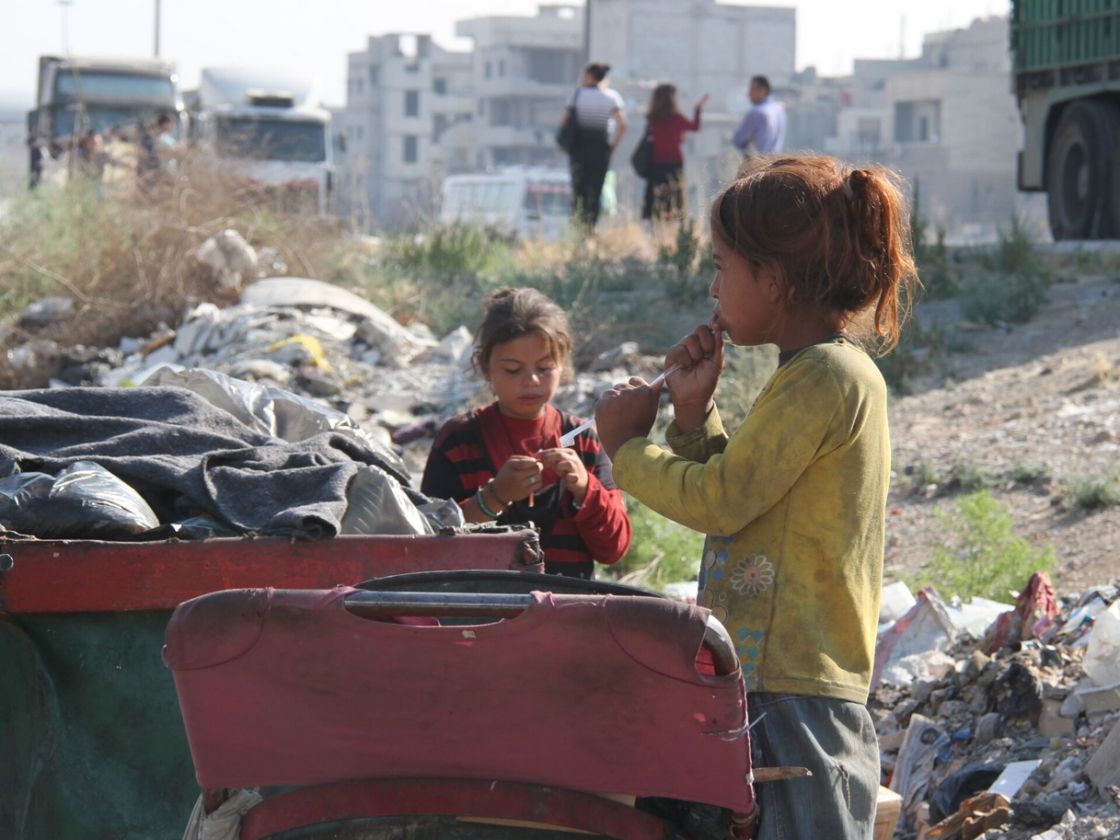- Editorials
- Posted
Kassioun Editorial 1229: How Do We Win the “War on Poverty”?
The current authorities, represented by Syrian interim President Ahmad al-Sharaa, raised the slogan “War on Poverty” a few days ago. This is a justified and ambitious slogan, one that resonates with the desires of more than 90% of Syrians who have lived below the poverty line for years.
Despite the importance of the slogan, it remains a slogan unless it is coupled not only with serious action to achieve it, but also with a sound methodology. History, including Syrian history, teaches us that slogans can actually turn into their exact opposite.
As part of the methodology required for a genuine war on poverty, we must first and foremost break with the policies and methodologies pursued during the bygone era. We say policies and methodologies, not slogans, because there are some who are working to perpetuate the same economic policies of the Bashar al-Assad regime by attacking the false slogans it raised.
More clearly, the basic foundations of the economic working and thinking system during the two and a half decades of Bashar al-Assad’s rule, and before that during the last decade of his father’s rule, were as follows:
First: The gradual but steady and escalating adoption of Western international institutions’ formulas since 2005. These include, in brief: “economic liberalization”; “free market economy”; “openness”; “privatization” and the destruction of the public sector; the gradual lifting of subsidies on various basic commodities; the gradual elimination of any social role for the state; the encouragement of trade, tourism, and the financial sector at the expense of industry and agriculture; and increasing the level of trade exchange with Western countries to 70% of Syria’s total foreign trade. Today, there is a push to implement the same formula on a broader scale and presenting it as a coup against Assad’s economic policy, when in reality, it is a continuation of what he began.
Second: Relying on Syria’s comparative economic advantages and geopolitical location, as they form the backbone of the Syrian economy. Comparative advantages are those we possess and those of others, and their prices are determined by supply and demand in the global market; for example, oil, gas, phosphates, wheat, and cotton.
Third: The adoption of the monetary (mercantilistic/usurious) school of thought to conduct national accounts, which has led to a permanent inflation of the value of the gross domestic product, and to an imbalance between the monetary mass and the commodity mass, always in one direction, which is the inflation of the monetary mass, and thus the continuous rise in prices, and consequently the impoverishment of those with limited incomes year after year, and the reduction of the size of the middle classes until they are wiped out.
A truly successful war on poverty requires a break with Assad’s approach and economic policies, and therefore requires:
First: Preserving and investing in comparative advantages, but shifting the focus of work towards absolute advantages so they become the backbone of our economy. These are the advantages that we as Syrians possess exclusively and almost monopolize, are characterized by very high rates of return, and require small to medium capital; and we have hundreds of such advantages distributed across the various Syrian governorates. The starting point is to identify these advantages, complete studies on them, and place them within a comprehensive investment map.
Second: Establishing agricultural industrial complexes that link production processes, reduce market manipulation of prices, and maximize added value, and thus returns.
Third: Breaking with the liberal policies we have consistently opposed since their implementation with Investment Law No. 10 of 1991. Conversely, shift the center of gravity of Syria’s foreign economic relations toward a new point of balance that is more in line with the true weights of international powers—that is, toward a point closer to the East, in contrast to Assad’s method of dragging Syria into economic dependence on the West.
Fourth: Review the entire methodology and way of conducting national accounts, starting with the method of calculating national income/gross domestic product, and arriving at real figures upon which clear policies can be built, and reducing the plundering through inflation and ultimately ending it.
Fifth: The cornerstone of the war on poverty is the poor people themselves, whose strength and energies must be harnessed as the country’s true producers. This requires significant support for education, health, and housing, which can be achieved through resources of absolute and relative values, and through the redistribution of wealth at the expense of the warlords.
Finally: Linking this entire approach to a political direction for the country, approved by a general national conference and implemented by a national unity government, which ensures balanced international relations that preserve the country’s independence and prevent its fall into dependency. Such an approach is essential to the success of the war on poverty.


